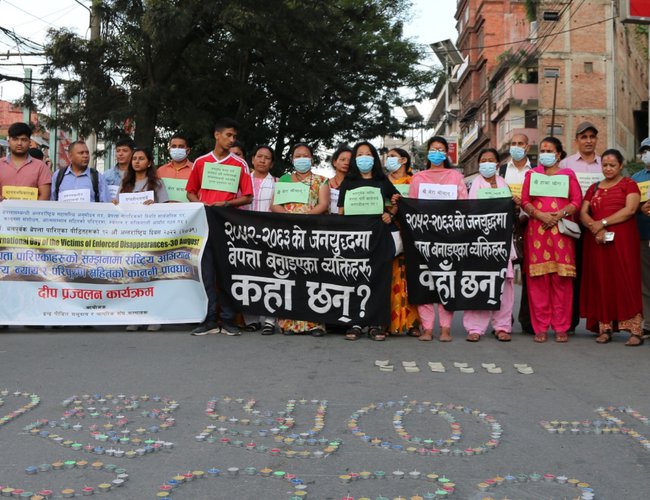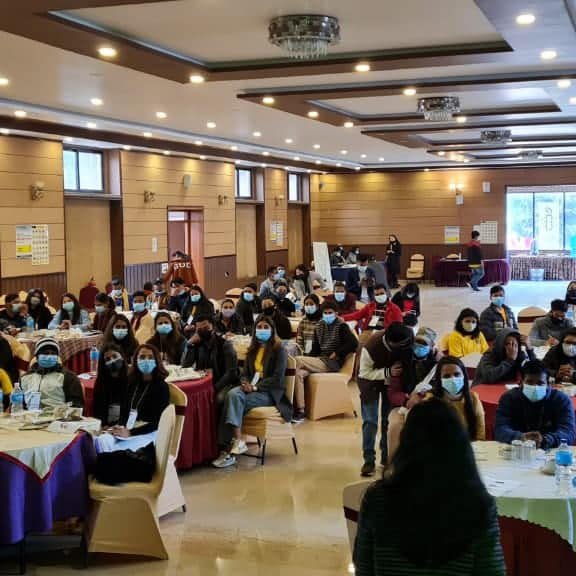
In the final week of January 2024, a group of women who had been raped and sexually assaulted during the conflict period by security forces and Maoist rebels engaged in discussions with leaders of four major political parties, representatives of Kathmandu-based diplomatic missions, officials from the United Nations, representatives of rights groups, and members of the media. They recounted their experiences and the anguish of being female victims of the conflict. Numerous women who had been victimized shared their harrowing stories of the atrocities committed by both Maoist rebels and government forces.
They contended that the peace process could not be fully established until women's dignity and self-respect were reinstated through justice. The women victims also expressed dissatisfaction that only a limited number of cases had been filed with the Truth and Reconciliation Commission (TRC) and questioned the reasons behind the exclusion of other cases. They highlighted that the current system was not conducive to supporting women victims. Many victims opted not to report their ordeals out of fear of reprisal if their identities were disclosed. Despite the courage shown by a few women who shared their stories, it is imperative to address the specific needs of female victims to ensure the effectiveness of the transitional justice system.
The Commission for Investigation, Verification, and Reconciliation of Disappeared Persons Act Amendment Bill, which was enacted in 2071 BS, was under review by the House of Representatives committee during the interaction program. Women participating in the program demanded that the amendment bill incorporate provisions that prioritize the rights and dignity of women victims.
Multiple organizations are dedicated to addressing the concerns of women affected by conflict. The Conflict Victim Women National Network actively campaigns for justice on behalf of these women. This network comprises various other organizations that are committed to raising awareness about the challenges faced by women victims, such as widows, survivors of rape, and those who have experienced other forms of sexual assault.
Bandana Ran, member of the Committee on the Elimination of Discrimination Against Women (CEDAW), has also been supporting victims of conflict raising the issues in their favor at national and international forum. Her effort is to make the transitional justice system gender friendly and women friendly.
Between 1996 and 2006, both the security forces and the rebels of the Communist Party of Nepal (Maoist) committed severe human rights violations and abuses that qualify as international crimes. These acts included unlawful killings, enforced disappearances, torture, and various forms of sexual violence, including rape.
According to a report released by the United Nations High Commissioner for Human Rights, the decade-long conflict may have witnessed around 9,000 serious violations of international human rights and humanitarian law. The conflict resulted in approximately 13,000 deaths and at least 1,300 enforced disappearances, with women comprising one third of the victims.
The Comprehensive Peace Accord (CPA) was signed on November 21, 2006, marking the end of the armed conflict. The conflicting parties committed to pursuing truth, addressing impunity, and providing assistance to the conflict victims. However, the fate and whereabouts of many individuals affected by the conflict remain unknown to this day.
Transitional justice mechanisms exhibit various shortcomings, such as the inadequate addressing of gender-based violations and concerns, particularly those impacting women. These processes have perpetuated and strengthened the marginalized position of women, a characteristic of the conflict itself. Women served as essential figures during the conflict as social and political participants, akin to men. Throughout the conflict, numerous women faced arbitrary arrests, detentions, torture, rape, and murder.
Many of these abuses were carried out due to connections with one of the conflicting parties or for being associated with either the Maoist or Government forces. Female relatives of those who were killed, disappeared, or tortured also endured suffering. They were forced to bear the responsibility of caring for the family while simultaneously seeking truth and justice for their loved ones.
Women assumed combatant roles during the conflict, deviating from their traditional duties. Nevertheless, their involvement was disregarded during negotiations and was not reflected in the terms of the CPA peace agreement. Following the signing of the CPA, the Government implemented various initiatives to assist conflict victims and address their immediate requirements. However, victims of rape and other forms of sexual violence, who had experienced torture and mistreatment, were excluded from the Government's assistance program.
Furthermore, the rehabilitation and reintegration of female combatants have been entirely overlooked. Women's engagement in the legislative and policy-making processes has not been realized. Despite their significant contributions during the conflict, women were largely marginalized in the post-conflict period.
A gender-sensitive approach is essential in Nepal's transitional justice processes to address the unique experiences of women during and after the conflict. It is crucial to understand the different causes and consequences of human rights violations and abuses, as well as their distinct impact on men and women. This understanding will help in designing and implementing transitional justice initiatives that are friendly towards gender.
In 2011, the UN Human Rights Council established the mandate of the Special Rapporteur on truth, justice, reparation, and guarantees of non-recurrence. The Council specifically directed that the mandate should incorporate a gender perspective throughout its work. The Special Rapporteur's report on July 17, 2020, highlighted the importance of adopting gender-responsive transitional justice mechanisms for states with serious human rights violations. The Human Rights Council has consistently emphasized the need to fully integrate a gender perspective into all activities related to the transitional justice process.
Despite the progress made, there are obstacles in the transitional justice system. The formation of the Truth and Reconciliation Commission and the Disappearance Commission, along with the support from the Supreme Court, Human Rights Commission, Women's Commission, and international organizations, have aimed to establish a victim-friendly justice system. However, the process has faced challenges due to excessive politicization and pressure from conflicting factions seeking blanket justice. Political parties in power tend to support the peace process, but once they are out of power, they often oppose its provisions.
Obstacles in Transitional Justice
Various measures have been implemented since the signing of the CPA, such as the establishment of the Truth and Reconciliation Commission and the Disappearance Commission as part of the transitional justice system. The Supreme Court, Human Rights Commission, Women's Commission, as well as several international organizations and UN agencies, have been aiding in the finalization of the peace process with a justice system that is supportive of victims.
However, the progress has been hindered by excessive politicization and pressure from two conflicting factions vying for comprehensive justice. Political parties in power tend to endorse the peace process under specific conditions, but once they are no longer in power, they begin to oppose the terms. The current amendment bill on transitional justice is said to be trying to bypass justice through methods that do not align with Nepal's Supreme Court ruling and international norms, making the goals of accountability and reparations hard to achieve. The Nepali Congress has shown support for the bill, while the CPN-UML has expressed opposition.
The parties altered their stance after modifying the ruling equation. On February 20th, the Law, Justice, and Human Rights Committee made preparations to approve a bill that would amend the Investigation, Truth, and Reconciliation Commission Act, 2071, on Disappeared Persons. However, due to a shift in coalition and political dynamics the following week, the bill could not be passed. As of March 25th, the committee has not convened for another meeting. Despite the UML's previous disagreement, they are now willing to pass the bill, but former Minister of Law, Justice, and Parliamentary Affairs Dhanraj Gurung, who is also the Vice President of the Nepali Congress, requested additional time from the Committee Chairman. He explained that two more matters needed to be discussed.
Previously, the bill faced obstacles due to the UML's dissatisfaction with certain provisions, including blanket amnesty, fast-track procedures, and gender-related issues. The Congress-Maoist party sought the UML's support to ensure unanimous passage of the bill through the committee. Now, with a change in political power and the UML as a ruling partner, the NC is determined to push the bill forward.

The recently revealed minimum policy priorities, similar to previous coalition minimum programs, stress the importance of promptly addressing outstanding tasks related to the peace process. The policy is dedicated to providing medical treatment, employment opportunities, and rehabilitation to individuals who suffered disabilities during the conflict period (1996-2006). Furthermore, it emphasizes the necessity of fulfilling obligations concerning the compensation, rehabilitation, and reintegration of families affected by the conflict.
Prime Minister Pushpa Kamal Dahal Prachanda has pledged to finalize The Commission for Investigation, Verification, and Reconciliation of Disappeared Persons Act, which was enacted in 2071 BS, during the upcoming session of the House. However, there are still disagreements regarding the bill.
The Prime Minister has been consistently striving to persuade the victims and other stakeholders that his government will pass the law to bring the peace process to a conclusion. During an event organized by the National Alliance of Victims of Human Rights Violations, the Prime Minister declared that the Bill would be given utmost priority in the forthcoming summer session of the Federal Parliament.
The Prime Minister emphasized his dedication to resolving the issue through national consensus, mentioning that democratic processes will be followed if necessary. Both the victims and the government are eager for a swift progress in this matter, with no room for uncertainty.
At the UNGA and its sideline meetings, the PM highlighted that Nepal's peace process is reaching its conclusion, not just a national concern. He assured that transitional justice will prioritize the victims by aligning with global standards and court rulings, ensuring a proper conclusion to the process.
A dilemma between the right to truth and the right to justice
Nepal's initial transitional justice bodies were established in 2015 with the purpose of gathering data on more than 60,000 cases. However, their efforts were unsuccessful in completing any investigations due to the country's Supreme Court ruling certain aspects of the law that created these bodies as unconstitutional. Currently, a new bill is being discussed as of March 2024, and Nepal's transitional justice community is facing and addressing the various challenges and dilemmas involved.
The approach of Nepal's draft bill has faced criticism regarding its treatment of women victims and the granting of amnesties, which the truth commission is expected to recommend in specific cases. To enhance clarity and coherence, the text has been reorganized to present information in a logical sequence, outlining the processes that should be followed.
Experts have stressed the importance of establishing an effective and well-equipped mechanism for criminal accountability before any suspensions of sentences can occur. The bill is currently in its final stage, and it is essential for all stakeholders to collaborate in order to ensure that the transitional justice process is inclusive and prioritizes the needs of the victims, ultimately fostering peace and development. Continued support from the international community is crucial in assisting Nepal in this endeavor.
Photos courtesy: Amnesty International Nepal and Conflict Victim Women National Network

Keshab Poudel
Poudel is the editor of New Spotlight Magazine.
- ERC Nepal Is Focused On Expanding Distribution And Transmission To The Private Sector: ERC Chair Dr. Dhital
- Jul 06, 2025
- FOURTH PROFESSOR Y.N. KHANAL LECTURE: Nepal-China Relations
- Jun 23, 2025
- Colonel JP CROSS: Centenary Birthday
- Jun 23, 2025
- BEEN: Retrofitted For Green
- May 28, 2025
- GGGI has been promoting green growth in Nepal for a decade: Dr. Malle Fofana
- May 21, 2025















